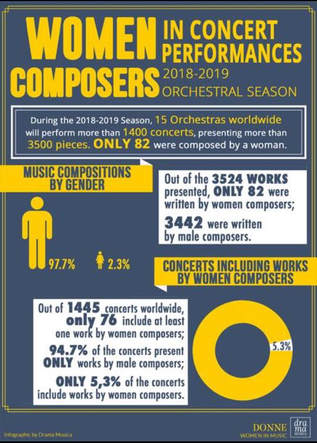
I had the opportunity to talk with co-founder Laura Colgate recently and discuss the Initiative’s plans, as well as what spurred the two women into action. The two met nearly accidentally, with a mutual friend introducing them when they both showed up at a restaurant. At the time, both women were in the process of finishing their doctorates (Joy in organ, Laura in violin) and were writing their dissertations on women composers. A later brainstorming session provided more than enough ideas to provide an agenda for the Initiative.
Laura’s “aha” moment came when she was in 8th grade and attending the Tanglewood Institute. She said, “… JoAnn Falletta conducted, and I remembered seeing her get on the podium and just being completely dumbfounded that a woman could conduct, and well… It had literally never occurred to me, it had never entered my brain that that was something I could do as a woman… I think a lot of females have that moment where you just go, ‘Oh really—I can--oh—OH, Okay!’ But by 8th grade, it’s already a little bit [late]… We need to get that into girl’s heads when they’re still five.”
The Boulanger Initiative (BI from now on) intends to combat that all-too-common experience through a three-pronged approach: performance, education and research, and commissioning new works. They plan to develop a concert series “devoted to presenting music composed by women, past and present,” as well as working towards addressing current inequalities on concert programming. The graphic to the right is courtesy of the Donne--Women in Music project (http://www.drama-musica.com/stories/2018_2019_orchestra_seasons.html )
The third prong, commissions of new works, will seek to generate support for established and emerging composers. They hope to commission at least one piece by their debut season of 2019/20. Eventually, all three divisions will work together and feed into activities like a “Young Composers Festival,” with established women composers working with young girls, and receiving performances by other young musicians.
The first major event BI is planning is a three-day launch festival starting on March 8, 2019 (International Women’s Day). The festival will be “non-stop women composers” with activities and events under one roof, all accessible by a cover charge. It will feature local D.C-area performers, an electronics demonstration, a documentary viewing, panel discussions, and master classes. Each day an internationally-recognized guest artist/chamber ensemble will participate in events, capped by a ticketed Main Stage performance in conjunction with a composer(s) that they have worked with, or from whom they have commissioned works. It promises to be an amazing festival!
The discovery of women composers really began with Women’s Studies programs in the 1970’s. Interest in the topic has waxed and waned over the nearly fifty intervening years. I was curious as to how Laura thought promotion of women composers might be more effective now than it has been in the past. “I think that, first of all, classical music has taken a completely different direction with entrepreneurship, and all of these new groups popping up. You look at the chamber ensembles and the new music ensembles, and those are the groups that are really getting the music played. Their numbers are making the more traditional venues really take notice, and look, and not have a choice anymore to make excuses and say ‘Oh, well, we don’t need to program that next to Beethoven.’” Laura mentioned the success of the Keychange Initiative [link] pushing to encourage music festivals to achieve a 50/50 gender balance in programming by 2022. Currently more than 100 festivals worldwide have signed on to the pledge, but only three of these are in the United States. “We are talking to a few educational organizations about starting a pledge of a similar nature, but with schools. For example, if there’s a composer’s summer festival, making sure that half of the students are women…. I think there’s a lot happening now that wasn’t happening then. I also think technology makes it much easier for us to reach bigger milestones.” Clearly public pressure and the current climate encouraging women’s activism is a factor in creating “buzz”; BI wants to be sure that they set a positive agenda for the future rather than negatively focusing on attitudes of the past.
Finally, I asked Laura a very unfair question—what are her favorite pieces by women composers? Having recently finished her doctorate with a massive recital of violin music by women composers, she has far too many pieces still close to her heart to choose. But, I was cruel and made her choose two.
Secondly, and very appropriately, Laura chose Lili Boulanger’s D’un matin de printemps (Of a Spring morning). Unusually, Boulanger wrote three versions of the piece—one for violin and piano, one for orchestra, and one for piano trio. Laura has played the first two versions, and is looking forward to playing the third soon. Here is the one for violin and piano, also performed by Laura:
You can keep up with the Boulanger Initiative’s activities through their website, https://www.boulangerinitiative.org and by liking their Facebook page. You can also join them and keep the momentum going by volunteering at https://www.boulangerinitiative.org/volunteer-1/ .
 RSS Feed
RSS Feed